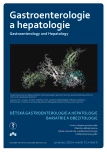-
Medical journals
- Career
Nutrition and bariatric-metabolic surgery
Authors: Hlavatá K.
Authors‘ workplace: OB klinika a. s., Centrum pro léčbu obezity a metabolických onemocnění, Praha
Published in: Gastroent Hepatol 2019; 73(6): 492-495
Category:
doi: https://doi.org/10.14735/amgh2019492Overview
Bariatric interventions are a very effective tool for treating obesity. However, success is largely dependent on patient compliance and observance of dietary regimens. Nutrition is crucial in this context, with the type of diet being dependent on the time after the operation. Postoperative diet should be rational, with an emphasis on proteins. Repetitive education is important to prevent undesirable nutritional deficits, as well as other adverse events.
Conflict of Interest: The author declares that the article/manuscript complies with ethical standards, patient anonymity has been respected, and she states that she has no financial, advisory or other commercial interests in relation to the subject matter.
Publication Ethics: This article/manuscript has not been published or is currently being submitted for another review. The authors agree to publish their name and e-mail in the published article/manuscript.
Dedication: The article/manuscript is not supported by a grant nor has it been created with the support of any company.
The Editorial Board declares that the manuscript met the ICMJE „uniform requirements“ for biomedical papers.
Keywords:
bariatric procedures – liquid food – mushy food – proteins – bariatric plate
Sources
1. Fried M et al. Bariatrická a metabolická chirurgie. Nové postupy v léčbě obezity a metabolických poruch. Mladá fronta 2011.
2. Brolin RE, LaMarca LB, Kenler HA et al. Malabsorptive gastric bypass in patients with superobesity. J Gastrointest Surg 2002; 6 (2): 195–203. doi: 10.1016/s1091-255x (01) 00 022-1.
3. Dolan K, Hatzifotis M, Newbury L et al. A clinical and nutritional comparison of biliopancreatic diversion with and without duodenal switch. Ann Surg 2004; 240 (1): 51–56.
4. Busetto L, Dicker D, Azran C et al. Practical Recommendations of the Obesity Management Task Force of the European Association for the Study of Obesity for the Post-Bariatric Surgery Medical Management. Obes Facts 2017; 10 (6): 597–632. doi: 10.1159/000481825.
5. Heber D, Greenway FL, Kaplan LM et al. Endocrine and nutritional management of the post-bariatric surgery patient: an Endocrine Society Clinical Practice Guideline. J Clin Endocrinol Metab 2010; 95 (11): 4823–4843. doi: 10.1210/jc.2009-2128.
6. Mechanick JI, Youdim A, Jones DB et al. Clinical practice guidelines for the perioperative nutritional, metabolic, and nonsurgical support of the bariatric surgery patient – 2013 update: cosponsored by American Association of Clinical Endocrinologists, The Obesity Society, and American Society for Metabolic & Bariatric Surgery. Obesity (Silver Spring) 2013; 21 (Suppl 1): S1–S27. doi: 10.1002/oby.20461.
7. Sherf Degan S, Goldenshluger A, Globus I et al. Nutritional recommendations for adult bariatric surgery patients: clinical practice. Adv Nutr 2017; 8 (2): 382–394. doi: 10.3945/an.116.014 258.
8. Westerterp-Plantenga MS, Lejeune MP, Nijs I et al. High protein intake sustains weight maintenance after body weight loss in humans. Int J Obes Relat Metab Disord 2004; 28 (1): 57–64. doi: 10.1038/sj.ijo.0802461.
9. Westerterp-Plantenga MS. The significance of protein in food intake and body weight regulation. Curr Opin Clin Nutr Metab Care 2003; 6 (6): 635–638. doi: 10.1097/00075197-200311000-00005.
10. Layman DK. The role of leucine in weight loss diets and glucose homeostasis. J Nutr 2003; 133 (1): 261S–267S.
11. UHN Toronto Western Hospital. Eating for health before and after bariatric surgery. [online]. Available from: https: //www.uhn.ca/PatientsFamilies/Health_Information/Health_Topics/Documents/Eating_for_Health_after_Gastric_Bypass_Surgery.pdf#search=bariatric%20plate.
Labels
Paediatric gastroenterology Gastroenterology and hepatology Surgery
Article was published inGastroenterology and Hepatology

2019 Issue 6-
All articles in this issue
- Surgical treatment of obesity and metabolic disorders – new challenges for different specializations
- Opinion of the Working Group on Pediatric Gastroenterology, Hepatology and Nutrition of the Czech Pediatric Society (PSDG ČPS) on the use of dietary measures in the treatment of Crohn’s disease in pediatric patients
- CDED diet in induction therapy of Crohn’s disease
- Diagnosis of focal liver lesions in children using contrast enhanced ultrasound
- Vitamin D – substitution after malabsorption operations
- Nutrition and bariatric-metabolic surgery
- Anti-TNF alpha-induced immune-mediated skin adverse reactions resolved by switching to ustekinumab
- Focal inflammatory liver lesions
- Obesity in children and kidney diseases
- Part 6 – Causes of death of patients with inflammatory bowel disease with a focus on hospitalization at the end of the patient’s life
- Congress report – Obesitology and bariatry 2019, Brno
- 36th Czech and Slovak Congress of Gastroenterology
- The selection from international journals
- Allogeneic, mesenchymal stem cells (ALOFISEL) are effective in eradicating complex peri-anal fistulas in Crohn’s disease
- Editorial
- Ružinovský gastroenterologický deň 2019 8. november 2019 ABSTRAKTA
- Novel upper gastrointestinal developments prof. Peter Malfertheiner – Gastro Update Europe 2019, Budapest
- Gastroenterology and Hepatology
- Journal archive
- Current issue
- Online only
- About the journal
Most read in this issue- Focal inflammatory liver lesions
- CDED diet in induction therapy of Crohn’s disease
- Vitamin D – substitution after malabsorption operations
- Allogeneic, mesenchymal stem cells (ALOFISEL) are effective in eradicating complex peri-anal fistulas in Crohn’s disease
Login#ADS_BOTTOM_SCRIPTS#Forgotten passwordEnter the email address that you registered with. We will send you instructions on how to set a new password.
- Career

